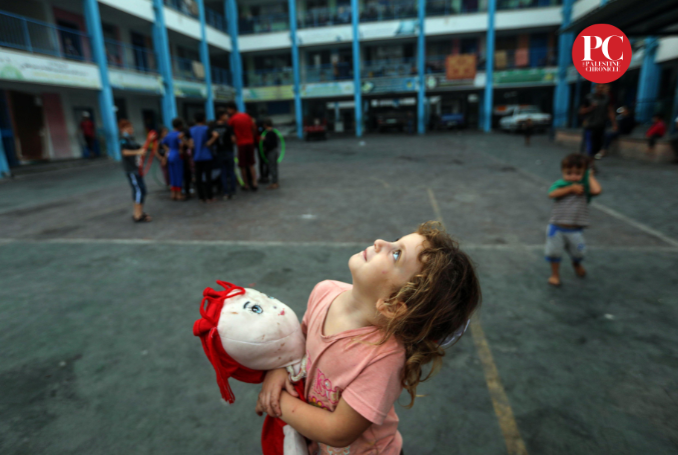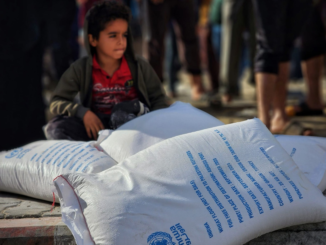
Noor Alyacoubi reflects on the fragile hope and uncertainty felt by families in Gaza amid ceasefire talks and the ongoing devastation.
EDITOR’S NOTE: This article, written by Noor Alyacoubi from northern Gaza, was prepared just hours before official confirmation that both the Palestinian Resistance and Israel had accepted the ceasefire deal.
Though ceasefire talks have reached unprecedented levels of seriousness, hope remains a fragile and fleeting emotion for many in Gaza—including me. Skepticism and denial cloud our hearts, a defense mechanism against the heartbreak of dashed expectations.
I fear allowing myself to hope, only to be let down—just as I’ve been countless times before. I hesitate to believe that peace is approaching, wary of the possibility that a new wave of displacement or loss may follow. I can’t even imagine the moment I’ll finally reunite with my family without bracing for the negotiations to collapse and grief to consume me again.
The last time I embraced my father, kissed my mother’s hands, and hugged my two brothers was October 2023. They were forcibly displaced to the south, their departure so abrupt that they didn’t even get to say goodbye. We naïvely thought it would only be a matter of days before we were together again. How foolish we were.
‘This Isn’t Real. It’s Just a Nightmare’ – Gaza, My Haven, My Loss
In March 2024, my family evacuated Gaza to Egypt in search of safety. That same month, our home in Gaza City was reduced to rubble. Since then, my thoughts have been consumed by the Philadelphia barrier and the Netzarim checkpoint, imagining what it would take to cross them and be with my family. While I know they are safer now, the separation has been agonizing. I dream constantly of the moment we will reunite. Does that moment feel closer now? My heart says yes, but I hesitate to trust it—hope has betrayed us before.
What I long for most is to see my father in his fabric shop, nestled in the heart of Gaza City. That shop isn’t just a place of work—it’s a piece of his identity, a sanctuary where his dreams were built and ours were supported. He inherited it from my grandfather, who first opened its doors decades ago, and over the years, my father poured his soul into its every corner.
The Road from Jabaliya – The Harrowing Details of a Palestinian Family Escaping Israeli Death
To me, the shop was a magical place. I’d sit on a stool in the corner, watching my father work with such precision and pride. Sometimes, he’d hand me small scraps of fabric, saying, “Make something with this. It’s a unique piece of fabric.” Those moments felt like quiet lessons, teaching me about resilience, creativity, and the importance of roots.
Each time I call my mother now, she tells me how much my father yearns to return to that shop. “He doesn’t mourn the loss of our home as much as he mourns the distance from his shop,” she said once, her voice heavy with emotion. That shop is more than bricks and fabric—it’s a testament to my father’s dedication and the cornerstone of our family’s livelihood and happiness.
I can almost picture him now, standing behind the counter, running his fingers over a bolt of fabric as he explains its quality to a customer. That image gives me hope, but it also deepens the ache of our separation. It’s not just a shop he wants to return to; it’s the life he built and the place where his heart feels most at home.
‘I Have to Keep Going’ – Raising a Baby during the Gaza Genocide
Living in Limbo
As I hold on to the hope of reuniting with my family and seeing my father in his shop again, I am reminded of the countless others in Gaza whose lives hang in the balance, their futures just as uncertain as mine.
For Ibrahim Salem, a father of two, the ceasefire isn’t a promise of peace but a desperate hope to uncover the fate of his home.
“I don’t want to return to normalcy. I just want to know if my house is still standing,” Ibrahim shares, his voice trembling with uncertainty. He and his parents, wife, and two daughters were forced to leave their home in the Jabalia Camp in October 2024 when the Israeli army initiated its attack on northern Gaza. “Is it still there, or has it been reduced to rubble like so much of Jabalia?”
Ibrahim’s plight mirrors that of hundreds of thousands of families who live in limbo, uncertain of the destiny of their homes.
‘This is Too Humiliating’ – Famine Overwhelms Gaza Once Again
Others, like 30-year-old Nirmeen, a mother of two, are exhausted by the endless cycle of displacement and survival. For her, a ceasefire means the hope of finding rest, even if only for a moment.
“Every day, I feel like I’m losing a part of myself,” she admits, describing the physical and emotional toll of her new reality. Washing clothes by hand in a ground-level basin, cleaning dishes in makeshift setups, and enduring the relentless challenges of tent life leave her utterly drained.
“I miss my old life, the small conveniences I once took for granted,” she reflects. “I don’t expect everything to go back to normal, but I just want to sleep in my own bed, look at a wall instead of a tent, and wash clothes in a machine instead of by hand.”
Even something as simple as switching on a light at night without worrying about power outages feels like an unattainable luxury. “I just want to light up the night without fear,” she says, her voice steady but filled with longing. Above all, Nirmeen craves safety. “I want to sleep one night without the sound of drones or explosions, without fear gripping my chest,” she adds.
‘Full Belly before Death’ – This is How We Are Surviving in Northern Gaza
The Ache of Separation
For 27-year-old Raheel Shareef, hope is even harder to grasp. “Everyone around me is optimistic, and the news sounds hopeful, but something inside me refuses to cheer up,” she says, her voice heavy with exhaustion. The weight of uncertainty has left her emotionally drained, unable to believe that peace will come after so much pain.
Raheel, her mother, five sisters, and two brothers fled their home in the Al-Tuffah neighborhood in October 2023, escaping the bombardment that tore through Gaza. Her father stayed behind, determined to guard the house they once called home, while her husband remained in northern Gaza to care for his aging parents amidst the relentless attacks. Raheel married her husband only a few months before the war began, and though they were still in the early stages of their relationship, she never got the chance to fully know him before they were torn apart by war.
“I long to see my father and husband,” she whispers, the ache in her heart palpable. “But I’m tired of waiting, tired of being broken and let down every time ceasefire talks lead nowhere.” The constant hope, followed by disappointment, has become an emotional burden, making it difficult for Raheel to hold on to optimism. The uncertainty of the situation terrifies her—she cannot shake the fear that the peace talks might collapse at any moment, leaving her and her family stranded in an endless cycle of waiting.
“I pray every day that we’ll all make it through, that by nightfall, we’ll sit together, alive and safe,” she says, her voice a mixture of yearning and fear. But even if the bloodshed stops, she can’t find joy in it. “Yes, I’ll be relieved if the bloodshed stops, but what’s there to celebrate?” Raheel asks bitterly. “Are we supposed to rejoice over the destruction of an entire country or the loss of 46,000 lives?” The devastation, the loss of countless lives, leaves no room for celebration, only the painful recognition of what has been lost.
“I don’t think I’ll ever feel happy again,” she says, the depth of her grief settling heavily in her words.
“We need months—maybe years—to heal.” Raheel’s voice falters as she reflects on the long road ahead, the journey of healing that feels impossible amidst the ongoing devastation.
(The Palestine Chronicle)

– Noor Alyacoubi is a Gaza-based writer. She studied English language and literature at al-Azhar university in Gaza City. She is part of the Gaza-based writers’ collective We Are Not Numbers. She contributed this article to The Palestine Chronicle.









Be the first to comment